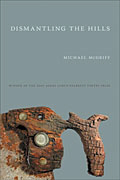Dismantling the Hills
Don’t read the back cover; Dismantling the Hills is not a love song to forests alive with work crews. It is an elegy for the soul-crushing life in the logging countries of Oregon, highlighted and made ironic against the background of a majestic Nature that should not only have been benign, but inspirational.
Don’t read the back cover; Dismantling the Hills is not a love song to forests alive with work crews. It is an elegy for the soul-crushing life in the logging countries of Oregon, highlighted and made ironic against the background of a majestic Nature that should not only have been benign, but inspirational.
From the very first poem, “Iron”, Michael McGriff laments the life that so few get out of:
This is the book
of the universe, where iron is the last element
of a star’s collapse and the moon retreats each moment
into oblivion. My blood fills with so much iron I’m pulled
to a place in the hard earth…
and I can turn away from nothing.
In his many evocations, Michael McGriff renders his sense of place and otherness with deliberate diction and well-placed references. Whether it’s J.C. Penny, the VFW, or burned tractor tires, each feature sinks us into the same silt fields his subjects sludge through. Take for example a fairly deliberate noir moment, “smokestacks pocked with peep shows / of flame and soot,” where the speaker gets caught up listing the trappings of Coos Bay. He then continues with the natural features of “mother-of-pearl, sea lion calls in the dark,” dialing back the melodrama. The noun lists sometimes drag on too far, a failing of many ‘get me outta here’ poets, but by and large, the language serves its purpose.
Like the best poetry of this kind, McGriff very judiciously integrates elevated or dramatic tones to make sure his poems matter. At times it gets overblown, demanding self-important microcosms from pools of mucky water. However, most of the time he finds his balance, as in “Mercy, Tear it Down”:
The vise in my throat bore down,
daylight broke its bones across the ridge.
Tear it down. From there you could see
the whole town. Tear it down, tear it down.
The long, dull lines that McGriff sometimes favors can have some rhythmic awkwardness that does not sound at all intentional. Similarly, the short lines he offers also can go too far in their thudding nervousness, one short declarative after another. But when he finds his line matched to his message, we can get marvelous effects. The end of the fourth section of “Ash and Silt” reminds us of Eliot’s ‘bitten macaroon’ with “how he unthreaded a tick from my thigh / under the cold half-light of our pantry”. Or consider the previous section: “She can shed her husk / and soar above everything with the red-shouldered hawks / until all of Coos Bay reveals itself as a grid of service roads, a net / stretched over thousands of acres of Douglas fir. From that height / it must be clear our days ahead and behind are one, / that everything we touch clings to its own ghost.”
Some of the best moments of this collection are actually when McGriff gets beyond the numb world of Coos Bay, either straying into an honest love lyric, as in “Lines written before the Day Shift,” which displays a genuine energy, or the wonderful dream-like sequence of “The Last Temptation of Christ.”
The small-town bring down can no longer be a go-to subject without either a larger idea or some remarkable handling, and this collection could have benefited from more diversity, if not in theme, then at least approach. The many imaginative leaps in “The Last Temptation of Christ” give plenty of evidence that McGriff would have been up to the task:
My friend slipped from my hands
and fell like a pinball through a thirty-foot redwood
then just lay in the duff laughing at the Oregon rain…
It was his feet you saw stitched
to the soles of your own
as you took those first watery steps
over the Galilee. It was his body
that wandered into marriage and three kids
and a gradual retreat from his wife…
But something’s filling you with bodiless light.
You turn to the untouchable, invisible kingdom
already decided for you and live forever.
That Rilke-like ending, where the Romantic-Modern undercurrents flash to the surface, is perhaps the best thing about these somber, beautiful poems. It is an actual manifestation of what we hope to see as we stare long into a deep green silence as CATs in the distance dismantle the hills.





